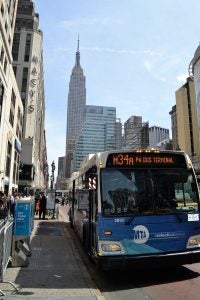 “What happened to oil in the late 1970s?” was a question assigned to me in elementary school to discuss with family over the Christmas holiday break. At the time, this question seemed innocent enough, and I didn’t know how my family would react about what I soon learned to be two oil embargos. Turns out when I brought it up one night, extended family members held a broad spectrum of views on the issue, and the question led to one of the most heated dinner arguments I can recall – until this year, at least. This holiday, family discussions focused on the presidential election. Fierce conversation ensued on standout topics. But, to my dismay, energy and the environment were just an afterthought.
“What happened to oil in the late 1970s?” was a question assigned to me in elementary school to discuss with family over the Christmas holiday break. At the time, this question seemed innocent enough, and I didn’t know how my family would react about what I soon learned to be two oil embargos. Turns out when I brought it up one night, extended family members held a broad spectrum of views on the issue, and the question led to one of the most heated dinner arguments I can recall – until this year, at least. This holiday, family discussions focused on the presidential election. Fierce conversation ensued on standout topics. But, to my dismay, energy and the environment were just an afterthought.
While it is clear that these topics did not play a decisive role in the election, 2017 will nevertheless bring a new set of challenges for energy and environmental policy and elevate the conversation to a higher level. Progress we’ve made in the past few years, including environmental protections and the continuity of agencies that support them, are at risk of being undercut by the new administration, and policies that will protect future generations are at peril. At the federal level, the fight to stop climate change looks bleak.
As Environmental Defense Fund recently noted in California, Illinois, Maryland, and Ohio, clear and deliberate leadership at the state and local levels will become even more important to advance clean energy goals. Fortunately, New York’s history of advancing favorable environmental policies have resulted in valuable lessons that can be adapted and implemented in other states to increase economic development, create jobs, decrease pollution, and improve the quality of life of people throughout the country. Read More »
 By Rory Christian, New York Director, Clean Energy, Environmental Defense Fund, and Adriana Espinoza, New York City Program Director, New York League of Conservation Voters
By Rory Christian, New York Director, Clean Energy, Environmental Defense Fund, and Adriana Espinoza, New York City Program Director, New York League of Conservation Voters










 The aftermath of extreme weather events calls for action. Recently, devastating hurricanes, wildfires in California, and the “bomb cyclone” in the northeast have reminded us of our vulnerability to climate change and the strength it takes to rebuild our communities. Months after the effects of Hurricane Maria, much of Puerto Rico remains without power – a painful reminder of the extent to which we rely on electricity, and the work required to maintain the electric grid.
The aftermath of extreme weather events calls for action. Recently, devastating hurricanes, wildfires in California, and the “bomb cyclone” in the northeast have reminded us of our vulnerability to climate change and the strength it takes to rebuild our communities. Months after the effects of Hurricane Maria, much of Puerto Rico remains without power – a painful reminder of the extent to which we rely on electricity, and the work required to maintain the electric grid. President Trump’s administration dubbed last week “
President Trump’s administration dubbed last week “ “What happened to oil in the late 1970s?” was a question assigned to me in elementary school to discuss with family over the Christmas holiday break. At the time, this question seemed innocent enough, and I didn’t know how my family would react about what I soon learned to be two oil embargos. Turns out when I brought it up one night, extended family members held a broad spectrum of views on the issue, and the question led to one of the most heated dinner arguments I can recall – until this year, at least. This holiday, family discussions focused on the presidential election. Fierce conversation ensued on standout topics. But, to my dismay, energy and the environment were just an afterthought.
“What happened to oil in the late 1970s?” was a question assigned to me in elementary school to discuss with family over the Christmas holiday break. At the time, this question seemed innocent enough, and I didn’t know how my family would react about what I soon learned to be two oil embargos. Turns out when I brought it up one night, extended family members held a broad spectrum of views on the issue, and the question led to one of the most heated dinner arguments I can recall – until this year, at least. This holiday, family discussions focused on the presidential election. Fierce conversation ensued on standout topics. But, to my dismay, energy and the environment were just an afterthought. Throughout the United States, utilities earn a profit through a tried and true regulatory model that has worked well for over 100 years. This model was built on the assumption that customers would use ever increasing amounts of electricity, and it worked for some time. But, as the need to save power and make electric systems more efficient becomes essential to adapt to climate change, this and other assumptions no longer hold true. Without changing how utilities are compensated, we run the risk of experiencing a true irony: utilities, the cradles from which our modern civilization rose, may become the chains preventing us from advancing toward a clean energy future.
Throughout the United States, utilities earn a profit through a tried and true regulatory model that has worked well for over 100 years. This model was built on the assumption that customers would use ever increasing amounts of electricity, and it worked for some time. But, as the need to save power and make electric systems more efficient becomes essential to adapt to climate change, this and other assumptions no longer hold true. Without changing how utilities are compensated, we run the risk of experiencing a true irony: utilities, the cradles from which our modern civilization rose, may become the chains preventing us from advancing toward a clean energy future.